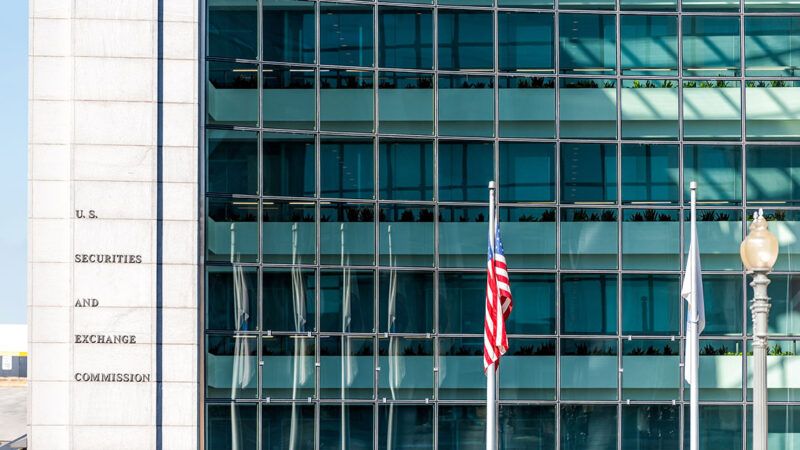An Administrative Court Scandal at the SEC
Why did the SEC suddenly dismiss dozens of cases?

Just weeks after the U.S. Supreme Court opened the door to more extensive judicial oversight of executive branch agencies' internal courts, the Securities and Exchange Commission (SEC) dropped dozens of those cases—including one that prompted the Court's ruling.
The sudden mass dismissal of 42 cases within the SEC's administrative legal system was the result of what the agency calls a "control deficiency." That's quite the euphemism for what actually happened. In a statement, the SEC admitted that officials within the enforcement division had accessed memos and drafts from within the administrative court system.
In layman's terms, the SEC's police force was able to view documents akin to notes between judges and their clerks.
The scenario highlights one of the fundamental problems with the administrative legal systems that independent executive agencies like the SEC use to adjudicate enforcement actions brought by the agency's regulators. Effectively, the judges in those courts are employed by the prosecutors. And in these 42 cases—and possibly more—they were sharing notes with each other but not the people they were regulating.
"We deeply regret that the agency's internal systems lacked sufficient safeguards surrounding access," the SEC said in the statement. "We take this lapse in controls very seriously and are committed to both informing the public about the scope of this issue and preventing any similar lapses in the future."
Despite the agency's pledge, it seems like dropping those cases was a step away from accountability.
"Without a doubt, the mass dismissal of these open cases is an evasion of the review promised by the Supreme Court," says Peggy Little, senior counsel at the New Civil Liberties Alliance (NCLA). "Conveniently, it also seeks to extinguish discovery on the breadth, depth and extent of file-sharing" between the SEC's courts and cops.
Little and the NCLA represented Michelle Cochran in her seven-year struggle against the SEC's administrative law system, which culminated in a unanimous victory at the Supreme Court in April. Writing the majority opinion in SEC v. Cochran, Justice Elena Kagan said plaintiffs caught up in administrative legal systems had the right to challenge the constitutionality of those procedures in the regular legal system without first having to complete the often expensive and time-consuming administrative legal process.
"The challenges are fundamental, even existential," wrote Kagan. "They maintain in essence that the agencies, as currently structured, are unconstitutional in much of their work."
That ruling portends more robust judicial reviews of how administrative legal systems operate. By preemptively dismissing those 42 cases in June, Little says, the SEC has slammed the door on those plaintiffs trying to get their day in a proper court.
"The SEC's use of its own misconduct as window dressing for this unprecedented mass dismissal of its open docket is an obvious and cynical ploy to evade imminent federal court review of agency administrative adjudication," she tells Reason.
The SEC is also stonewalling other attempts at discovering more details about malfeasance within the agency's administrative court system. It has missed a deadline to respond to a Freedom of Information Act request filed by the NCLA seeking details like the names and job titles of SEC staffers involved in the "control deficiency"—information that the agency has not released despite promising to keep the public informed about the scope of the lapse.
The SEC has also dodged congressional inquiries. At a hearing about the control deficiency in May, SEC Director of Enforcement Gurbir Grewal said the breach between judicial and enforcement branches was reported as soon as it was discovered. But reporting by The Wall Street Journal indicates the agency knew about this problem in 2022 and waited until after the Supreme Court's Cochran ruling to make the information public.
At the conclusion of that hearing, Rep. Bill Huizenga (R–Mich.) chided Grewal for his evasiveness and the agency's failure to be forthright about the extent of the file sharing.
Meanwhile, the SEC's inspector general has apparently been sidelined from investigating the control deficiency. Instead, the agency has hired an outside firm, Berkeley Research Group, that regularly contracts with the SEC for consulting and analysis work. That should raise some red flags too, as a major vendor has little incentive to uncover findings that might jeopardize future contracts.
The SEC, naturally, has redacted key information from its contract with Berkeley, including how much taxpayers are paying for the firm's investigation—an investigation that should properly be carried out by the inspector general instead.
The NCLA alleges that the agency used its own malfeasance as an excuse to dismiss dozens of cases that might have brought constitutional scrutiny to the entire administrative law system and that it now seeks to cover up the extent of that malfeasance. For individuals like Cochran, having these cases dismissed means there's no chance for justice—even after the Supreme Court ruled that she has a right to seek it.
It all points to the need for serious legal and congressional scrutiny of the administrative court system, and not just within the SEC.


Show Comments (18)